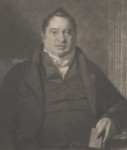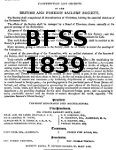

 George Charles (Bo'sun) Smith 1782-1863
George Charles (Bo'sun) Smith 1782-1863
right - mezzotint of 1819 by Abraham Wivell [National Portrait Gallery]
During his long life G.C. Smith, a Baptist minister, was energetically and intimately involved in an astonishingly wide range of missionary and philanthropic projects for seafarers and their families. Here we concentrate only on those in this area - principally in Wellclose Square and around Dock Street. He was a genuine pioneer, knowing seafarers' needs from the inside and responding to them long before others; but his ministry was dogged with controversy, as former collaborators fell out with him and made very public criticisms of his activities - to which he responded in like manner! He was not a committee man, or easy to deal with, and stood on his dignity and his absolute conviction of his calling: at one stage he described himself as 'George Charles Smith BBU' (Burning Bush Unconsumed). The organisations which he and others had founded constantly regrouped - often with confusingly-similar titles, making it difficult to entangle the picture. He himself said that future historians would have to sift and invesitage for truth amidst rubbish of reports, speeches, circulars, and resolutions - to which he himself made a major contribution! He was a prolific writer and magazine proprietor, in his earlier years writing with an attractive and salty vigour, but latterly degenerating into rehashing old controversies. ( See here for sources of further detailed information. Note: some of these dates and details are drawn from the 1898 entry in the Dictionary of National Biography (1885-1900, vol 53) by George Clement Boase, others from Roald Kverndal's writings, and others from Smith's own magazine writings.)
Here
is a summary of his life and some of the projects and institutions he established, and some of the conflicts that ensued:
 1807-25, and 1843-63:
pastor of the Octagon (renamed Jordan in 1822) Baptist chapel in
Penzance, building and supplying six other local chapels between
1812-16, preaching controversial open-air missions throughout the
south-west, forming the Home Missionary Society in 1819, but also
spending much time away: briefly in 1814 as an army chaplain in Spain,
from 1817 preaching on board ships in the Thames (the Bethel Thames Preaching Mission, when he first used the Bethel flag [modern version right] as a symbol).
1807-25, and 1843-63:
pastor of the Octagon (renamed Jordan in 1822) Baptist chapel in
Penzance, building and supplying six other local chapels between
1812-16, preaching controversial open-air missions throughout the
south-west, forming the Home Missionary Society in 1819, but also
spending much time away: briefly in 1814 as an army chaplain in Spain,
from 1817 preaching on board ships in the Thames (the Bethel Thames Preaching Mission, when he first used the Bethel flag [modern version right] as a symbol).|
AFFECTING SCENES IN THE MARITIME FEMALE
REFUGE SEA CHARACTERS IN THE SAILORS' REST
ASYLUM The conversation ceasing, one of the gentlemen piesent offered thanks to Almighty God for the evening meal, and the respective berths withdrew to a neighbouring room, and returned in order, each man bearing in his hand a bason of soup; a bag of biscuits was then produced, and the steward proceeded to present each sailor with one and a half, but finding there was not sufficient to supply them all with an equal share, some present raised a few shillings to procure more, and the gratitude of these courageous men was both pleasing and affecting. Expressing to a respectable gentleman resident in London who was with us, and who ku taken an early and faithful interest in these scenes, my exceeding pleasure at the spectacle, he said, with flowing tears, 'Oh! sir, my heart has many times been wounded' when through the misrepresentations of enemies, the steward has sent to my house to say that he had not a single biscuit to give to these hungry, loyal, and valiant men.' Leaving this inspiring scene, the committee ascended to the room in which the seamen sleep, consisting of a large airy floor, over which clean strow is spread, and when many a noble-minded man has taken repose, and found that shelter which the more ostentatious forms of British benevolence have hitherto denied him. Just as the Committee were about to retire, a minister arrived with a view to preach to the men whose natural hunger had just been satisfied, and from enquiry at the hands of a gentleman who had occasionally preached there, I was informed that it would be difficult to select a more attentive auditory in any part of the kingdom. I have Mr. Chairman, nothing more to add beyond pledging my veracity for the correctness of this account, and assuring this committee that so far from having thrown an adventitious coloring over this hasty picture, I have conveyed but a faint idea of the truth, and that the scenes of the last week will ever be placed by me among the most deeply interesting of my life. My personal conviction is, that the British and Foreign Seamen and Soldiers' Friend Society is effecting a great work—laboring where others ether cannot or do not reach—and that its objects deserve the warmest and kindest support. |
 1833: in the event, Smith retook the offensive; despite his accrued debts, he promoted yet another body, the London Mariners' Church Society, or Bethel Flag Union
in an attempt to regain the ground; initially there was a strong
financial response, easily exceeding that of its rival, and in April it
became - guess what? - the British and Foreign Sailors' and Solders' Bethel Flag Union.
But a former ally (one of the resigned directors), the Baptist minister
Dr F.A. Cox, decided that a new initiative independent of Smith was
needed, and fellow-Baptist Revd George Fife Angas joined with him in
promoting the simply-named Sailors' Society,
hoping to become a single non-sectarian mission agency rising above
party and personal hostilities; it had high-profile patronage, both
from the City and the churches (including some Anglican support). When
it took over the ailing PLBUS a couple of months later, it became the British & Foreign Sailors' Society.
Henceforth Smith regarded this body as his betrayers, and wrote
vindictively about them, referring to them as the 'Jeffrey Square
Society' (the location of their office in St Mary Axe); right are their 1839 constitution and objects.
1833: in the event, Smith retook the offensive; despite his accrued debts, he promoted yet another body, the London Mariners' Church Society, or Bethel Flag Union
in an attempt to regain the ground; initially there was a strong
financial response, easily exceeding that of its rival, and in April it
became - guess what? - the British and Foreign Sailors' and Solders' Bethel Flag Union.
But a former ally (one of the resigned directors), the Baptist minister
Dr F.A. Cox, decided that a new initiative independent of Smith was
needed, and fellow-Baptist Revd George Fife Angas joined with him in
promoting the simply-named Sailors' Society,
hoping to become a single non-sectarian mission agency rising above
party and personal hostilities; it had high-profile patronage, both
from the City and the churches (including some Anglican support). When
it took over the ailing PLBUS a couple of months later, it became the British & Foreign Sailors' Society.
Henceforth Smith regarded this body as his betrayers, and wrote
vindictively about them, referring to them as the 'Jeffrey Square
Society' (the location of their office in St Mary Axe); right are their 1839 constitution and objects.|
A DREADFUL WRECK AND PLUNDER OFF THE WRECKERS ... Last year [1845] two dissenting lawyers brought an action of ejectment to force me out of the Church, having obtained permission of the only legal surviving elder, a weak, feeble, aged man, at Brussels.The rent was offered the lawyers, but they would have the Church. Last February, Dr. Burder's lawyers arrested me for the costs of their own action, and cast me into this prison, and my greatest enemies of the Jeffery-square Society have taken this Church forcibly, and most unjustly torn it from me, after the public have laid out 4,500l. upon it, in twenty years, and 1 have been deprived of 4000l. salary, in the last thirteen years, by the desertion of the ministers, and suffered inexpressible affliction and imprisonments, through the tender mercies of these dissenting ministers, who made all the tradesmen lose 4000l. debts in 1832. Last year this Society appeared to be sinking, as they were obliged to give up their old warehouse at Bell Wharf; but Hyatt and Haliday, and Hooper, of Shadwell, and Queen-street, Ratcliffe, having a host of East London dissenting Anti State Church Association ministers to join them, are now falsely asserting that the church was offered them by the trustees. There is only one of any consequence at Brussels, and the lawyers act for him. What a story this would be from Rosemary Lane, or Houndsditch, at a Police Office:—"The goods were offered you?" "Yes, sir." "Did you not know that they were stolen, and that the person from whom they were stolen was perishing in prison?" Such is the humanity of those who now boast of Wellclose-square! Well, neighbours and countrymen, there is a righteous God, and he will one day appear to the confusion of such men: I can only pity them, and pray for them, as the Lord Jesus Christ did when he hung upon the Cross of Calvary, for his murderers, and said, "Father, forgive them, they know not what they do." Still, I wonder that an aged minister like Charles Hyatt, sen., should so lend himself to the follies and extravagances of his son, who seems the prime mover in all this injustice and cruelty, with Halliday, and Gull, and Hooper, of Queen-street Chapel, Ratcliffe, and Swinborn of Limehouse. PROSPECTS OF DELIVERANCE FROM PRISON IN JUNE Thursday, May 22nd.—I have this day posted letters to the Society for the Discharge and Relief of Debtors imprisoned for small sums. About a fortnight since I was considering after my long affliction and most unjust and cruel imprisonment, how I could possibly obtain a release, and I could see no way whatever open for me as I had not the means of offering a compromise, and wished impossible to avoid passing through the Insolvent Court. At length the supreme governor of this Queen's Prison most unexpectedly and unsolicited kindly sent me a printed form of the above Society, by which it appeared, that their rule extended to debts of 90l. for compromise or assisting a prisoner through the Insolvent Court. I was much affected with this kind and spontaneous action of Captain Hudson of the Royal Navy, whom we now recognize as our Keeper or Governor here. I have had this printed form duly filled up, and as it is necessary that the governor should sign it, I sent it to the turnkey at the gate to be forwarded to this gentleman. It was shortly returned to me with his signature, and I was directed to seal and post it, addressed to the Secretary, at Craven-street, in the Strand, and with a view to recommend my case in particular, the Governor had kindly written on this letter by way of recommendation, the following lines:—"THIS PERSON IS IN A VERY PRECARIOUS STATE OF HEALTH FROM IMPRISONMENT, WHICH IT WOULD BE AN ACT OF CHARITY TO RELIEVE HIM FROM. J HUDSON, KEEPER. MAY, 22, 1845." I was so much affected with this mark of kindness, that I thought how God touched the heart of Paul's jailor, at Phillipi, as it is recorded in Acts xvi.,—And the keeper of the Prison told this to Paul, saying, The magistrates have sent to let you go; now, therefore, depart, and go in peace. My soul was much melted at this, and I wept for some time over it, and thought of all the dissenting and methodist ministers in London; not one of them has come near this prison, or sent to it, to see whether I was living or dying. Not one of them has manifested the least sympathy, compassion, or brotherly love in appearing to help a poor prisoner who has fallen among thieves, that have cast him into prison and deprived him of his church and taken possession of it, and opened it, and boasted what Jeffery-square can do in wounding a prsisoner's very soul, and leaving him half dead. Oh, no! it is quite in accordance with the parable of our Lord Jesus Christ, that the priests and levites pass by on the other side; but a Samaritan, "THE KEEPER OF THE PRISON", has more bowels of compassion than all the baptist, methodist, and independent ministers in the kingdom, and he pours in the oil of consolation and directs to a society as to an inn, and in effect adopts the very language of the Samaritan, by saying, "Take care of Him." Surely God will repay the Governor for this, and the deputy govenor who called upon me this morning, was equally kind, as he would have signed most cheerfully had the governor been officially absent. O, ye ministers of God, how little compassion you have for prisoners! What millions will hear it said in the last day, "I was sick and in prison and ye visited me not." Well, Jesus Christ takes up the prisoner's cause, and with him I leave it. The Society meets the first Wednesday in June, and if the Lord please they will offer a compromise for me, as The Danish Church Martyr, or assist me through the Insolvent Court; so that next month, if the Lord will, I may be delivered and restored to poor sailors and orphans, and face these unjust and cruel men of Jeffery-square, who now boast, by bills and books that they have succeeded in obtaining possession of Naboth's vineyard; but, if Naboth should not die this year, and God should graciously grant him a release, such Ahabites may yet have to repent the iniquity of listening to money-hunting lawyers; and while I shall merely progress in the cause of God, they may witness such frowns of Providence, and such tailings off from the church, that it may yet prove a burdensome stone both to them and the poor misguided lawyers, so that we have need to pray that God will be pleased to give them all repentance, that they may mourn over their great wickedness that their families be not ruined. |
Back to Episcopal Floating Church | Back to St Paul Dock Street | Back to Danish Church